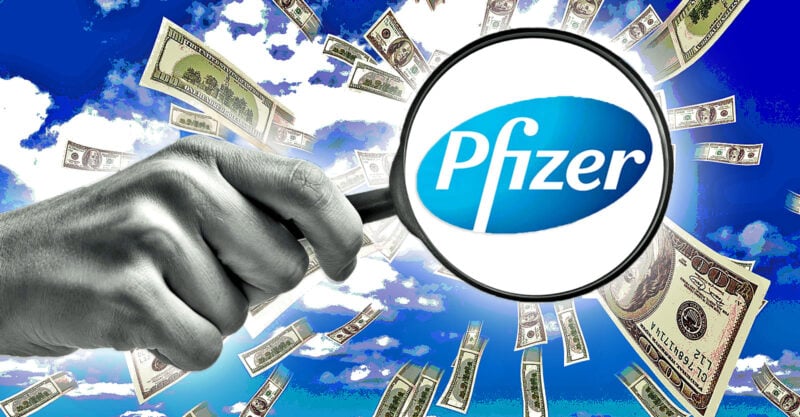
Pfizer used an “egregious tax gimmick” to avoid paying taxes, joining a growing list of Big Pharma who have shifted their US-based profit reporting offshore, according to a new Senate Finance Committee report.
By shifting profits offshore, Pfizer carried out what lawmakers say may be the ‘largest tax-dodging scheme in the history of Big Pharma,” according to Senate Finance Committee Ranking Member Ron Wyden (Democrat-Oregon).
In 2019, Pfizer sold $20 billion worth of drugs to American consumers but reported zero dollars in taxable income to the US government – the drug-maker claimed that all of its profits were earned offshore, according to a new investigation into the company published by the committee last week.
The scheme allowed Pfizer to avoid billions of dollars in taxes in a single year, Wyden said.
The company also signed nondisclosure agreements with the governments of Singapore and Puerto Rico about special tax deals in a move to conceal from Congress the details of its tax-avoidance plan.
Since 2021, Wyden has been spearheading investigations into large drug-makers’ tax strategies. He said Pfizer’s scheme was even larger than those of other Pharma giants, including AbbVie, Merck, Bristol Myers Squibb and Amgen. The committee’s investigation of the other drug companies uncovered similar large schemes to avoid paying corporate income tax rate on profits from drug sales to US patients.
“Pfizer joins a growing list of massively-profitable pharmaceutical corporations that show little-to-zero US profits on tax returns, even though the US is big pharma’s largest customer market,” the report said.
The report focused on 2019 returns but noted that Pfizer also reported no taxable income in the US in 2018 or 2020.
A recent review by The Lever also found that Big Pharma routinely engages in tax avoidance. In 2022, major US pharmaceutical companies reported over $214 billion in revenue but only $10 billion in profits in the US. Those same companies reported over $171 billion in revenue outside of the US and over $90 billion in profits – but US consumers pay the highest pharmaceutical costs.
Wyden’s report stated that Pfizer avoided paying taxes using what the report described as an “egregious tax gimmick” called “round-tripping,” where a company that makes sales to US customers can shift the income offshore.
A 2017 tax law enacted under the Trump administration cut the corporate tax rate from 35 per cent to 21 per cent. The Trump tax cuts also cut the rate on foreign income to 10.5 per cent, according to the report. Offshore profits are subject to the lower 10.5 per cent tax rate.
“Every dollar that big pharma can shift out of the US gets its tax rate cut in half,” the report said.
The remaining tax liability can then be offset by taxes paid to the foreign jurisdiction where a company is registered, the report said. Wyden said Pfizer got “sweetheart” deals in Singapore and Puerto Rico that exempted it from taxes there and told Congress it could not share the information about the tax arrangements because they were confidential.
As a result, Pfizer paid no US taxes on billions of dollars of profits generated in the US.
Round-tripping can also include offshore manufacturing, shifting intellectual property rights to tax havens, aggressive transfer pricing and other types of partnership arrangements that allow companies to send income to offshore tax havens.
Wyden previously found AbbVie in a similar round-tripping scheme, where the company in 2022 reported 99 per cent of its taxable income offshore – in Bermuda, Puerto Rico and elsewhere – to avoid paying billions in taxes on sales of prescription drugs in the US, according to the report.
Merck similarly used a round-tripping scheme to ensure all profits from US sales of its blockbuster cancer drug Keytruda would be taxed at the offshore 10.5 per cent tax rate. None of the $37.1 billion in US-based Keytruda sales from 2019-2022 were treated as US earned income because the intellectual property rights for the drug are held in the Netherlands and the drug is manufactured in Ireland.
Pfizer is headquartered in New York. It has more than 300 subsidiaries in more than 60 different countries, according to The Lever, with 98 subsidiaries based in known tax havens such as Ireland, Switzerland, the Netherlands, the British Virgin Islands, Singapore and Puerto Rico.
Pfizer pushed back on the report, stating that the report doesn’t offer “an accurate portrayal of the 2017 Tax Cut and Jobs Act (TCJA) effect on Pfizer,” according to Fierce Pharma.
“As we have communicated, substantially all of Pfizer’s worldwide income is subject to tax in the United States resulting in Pfizer paying US tax on a larger portion of its global income than it had pre-TCJA,” a spokesperson explained.
From 2021 through 2024, Pfizer paid more than $12.8 billion in US income taxes, as publicly reported in the company’s financials and securities filings, the spokesperson added. The company did not dispute the report’s allegation that it hadn’t paid any taxes in 2018-2020.
In more bad news for Pfizer, The Wall Street Journal reported last week that US prosecutors are investigating allegations by a former Pfizer scientist who now works at GSK that Pfizer delayed announcing the results of its COVID-19 vaccine trials in 2020 until after the election.
- A Tell Media report / by Brenda Baletti, is a senior reporter for The Defender








